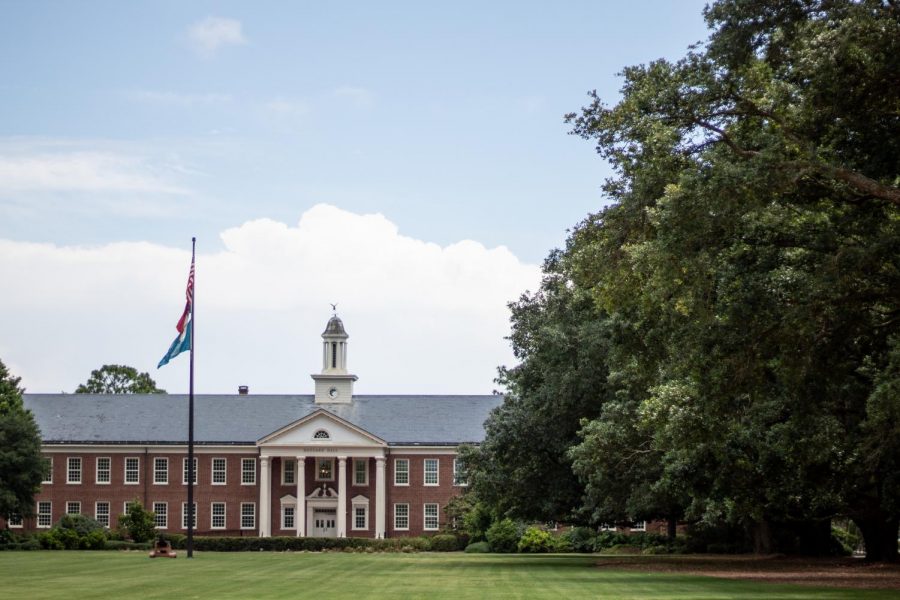UNCW faculty and staff respond to insurrection at the Capitol
Front of UNCW’s campus .
On Jan. 6, a violent mob descended upon and stormed the U.S. Capitol building in protest of Congress’ confirmation of Joe Biden’s win of the 2020 Presidential election. Windows were smashed in, items stolen and vandalized, as rioters roamed freely among the Capitol building as Capitol police failed to maintain control.
Since then many have condemned the violence including members of Congress, locally elected officials around the county and various others.
“January 6 is a pretty dark day in our democracy,” said Aaron King, who has a doctorate in political science and is an associate professor of Public and International Affairs. “It’s something that I had trouble describing what was happening when people were asking me. It’s a sad culmination of a tumultuous several years. I’m speaking from merely the perspective of the health of a democracy, not from a democrat, republican, or conservative, liberal anything like that. I think to see the level of violence and disregard is pretty disheartening, both as an American but also as a political scientist who studies this stuff.”
Sarah Gaby, an assistant professor of sociology specializing in social movements and race and ethnic inequality, said the insurrection was a result of the escalation of this movement of pro-Trumpians.
“Generally what we see happening is an escalation of what we’ve seen building with this movement to date,” said Gaby. “We can think of other sorts of violent challenges that have come up, even things like the anti lockdown protests that we saw coming. This is the escalation of a movement that is becoming increasingly violent and threatening to the state, but that’s getting signals of strong opportunities to continue to have power and influence and so is building and growing and taking advantage of instances where they rightfully perceived that they won’t be challenged for the kind of actions that they’re going to take. So that’s what we see happening when we see this Capitol protest or insurrection as we’ve mostly been calling in the movement community take place.”
People have since pointed out how overwhelmed and underprepared Capitol police were despite talks of what this event would like on various social media platforms.
“The idea that we were unprepared is quite a strong signal about the way that the state (meaning the government, the police, the FBI) respond to different forms of threat,” said Gaby. “In February of 2020, the FBI identifies groups like this as a threat to national security and they lump them together with foreign terrorist organizations like ISIS. So there’s some sort of attention to these kinds of groups, a long time before we see this happen. And we know that the media is reporting that this is going to happen.
“You’ve probably seen a ton of these pictures of what the Capitol looked like for Black Lives Matter protest and what it looks like here right, which is maybe a slightly disjointed comparison, but the idea is like who does the state see as a threat and why and what does that mean in response. So the idea that we should be afraid of people who look like our leaders who might threaten to do violence to Mike Pence or something is a little bit harder for the state I think to mobilize the kind of response that it does to something like Black Lives Matter.”
Many are questioning where we go from here and what this means for a country that in the past couple of years has been described as growing in its political division.
“I think a lot of people are talking about it like this is the last protest in this or the last insurrection effort in this trajectory and I don’t think that’s right,” said Gaby. “I think this is a growing movement and if it doesn’t face the kind of response that suppresses movement, participation will just continue to see an escalation. And so, from a theoretical perspective, I think that’s really the piece that we’re waiting to see.”
King also noted that there is definitely something that can be learned from the insurrection of the Capitol. We have seen what can happen when people take rhetoric, in this case about people stealing elections, too far.
“If anything, this is sort of a real important moment to look in the mirror to see where we’re at and to just look at how divided we are right,” said King. “It used to be when we would talk about political polarization and people say well we’ve never been more polarized. Well wait a second guys like we had a civil war, like that was pretty polarized and this, we aren’t to the point of civil war, but when you have people breaking into the Capitol building into one of their three branches of government upset about something that you feel was stolen from you I mean that’s pretty bad.”
Gaby said this insurrection is also time to use our critical thinking skills and really get at the heart of what it means to cross the line of a protest and how something like this can challenge how we understand protest and social movements.
“Regardless of your perspective on what happened or whatever the case is it gives us these really rich opportunities to think critically about the events in front of us and to make sense of what does it mean to cross the line out of being considered a protester,” said Gaby. “How do we say what that is and can we think of where this puts us and I think these sorts of events are really rich opportunities.
“I was teaching social movements at UNC-Chapel Hill when Black Lives Matter became really public. Same thing, really nice engagement from students because they want to make sense of these things, no matter what their perspective is on them. They want to understand how we can, could we have seen this coming. Do we know what’s gonna happen next? All of these kind of big questions that are extremely hard to answer but that we can kind of get some clues.”
King also said that we should not let our political differences ruin our relationships with others and that we need to take the time to calmly better understand one another.
“At the same time, there’s definitely a line to be crossed like you have to be able to stay how terrible what happened last week was,” said King. “That’s not a Republican or Democratic issue. There’s some things that sort of go beyond politics, affirming the idea that Black Lives Matter, and that we’re all created equal. That’s not a partisan thing, that is just truth.
“The fact that you can’t have people without evidence staying that election outcomes did happen, you can’t have people trying to attack and overthrow the government because you don’t like it. Again these are above politics, and I think that if we could all be on the same page on some things we’ll be in a better spot.”
It is unclear how this event will be remembered in the years to come and history books, but it certainly will not be forgotten. Especially since it was the first time that the Capitol had been breached in 200 years.
“I certainly think that presentation of the narrative of it about insurrections and violence we’re already seeing that change now, from when it first happened. I think that narrative will probably become more solidified moving forward,” said Gaby. “But you know, as with all history and retelling we’ll get some small part of it, and I think it’ll be really interesting to see which part of it makes it in there and kind of how we conceptualize it. What is this moment in time around systemic racism and what do we think this has to say about that. So it’ll be interesting to see if there’s framing around that in the history books.”












